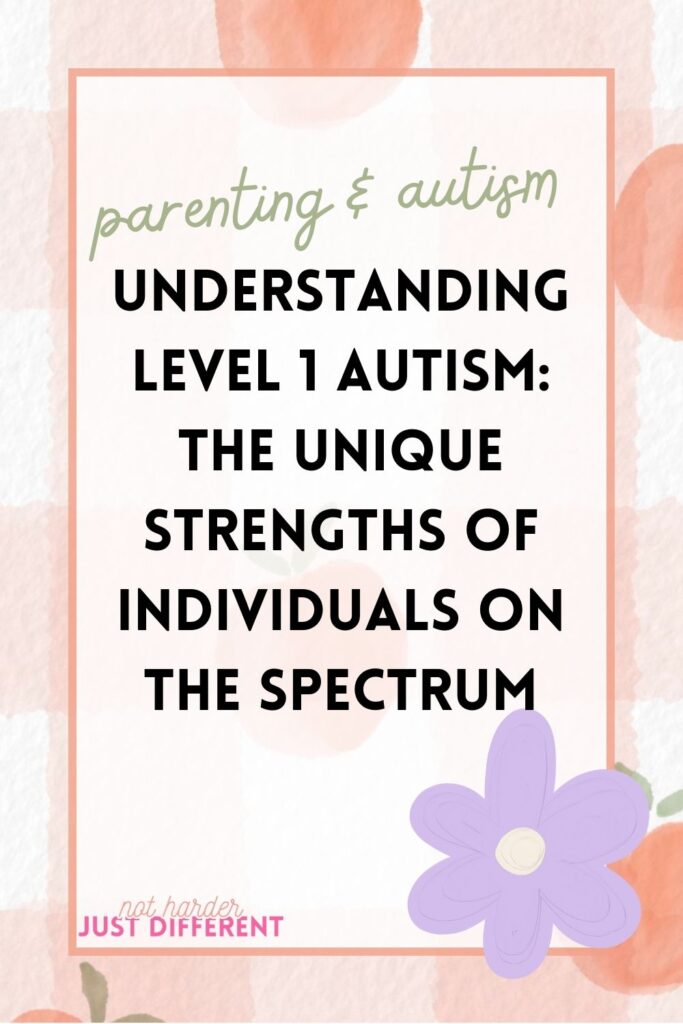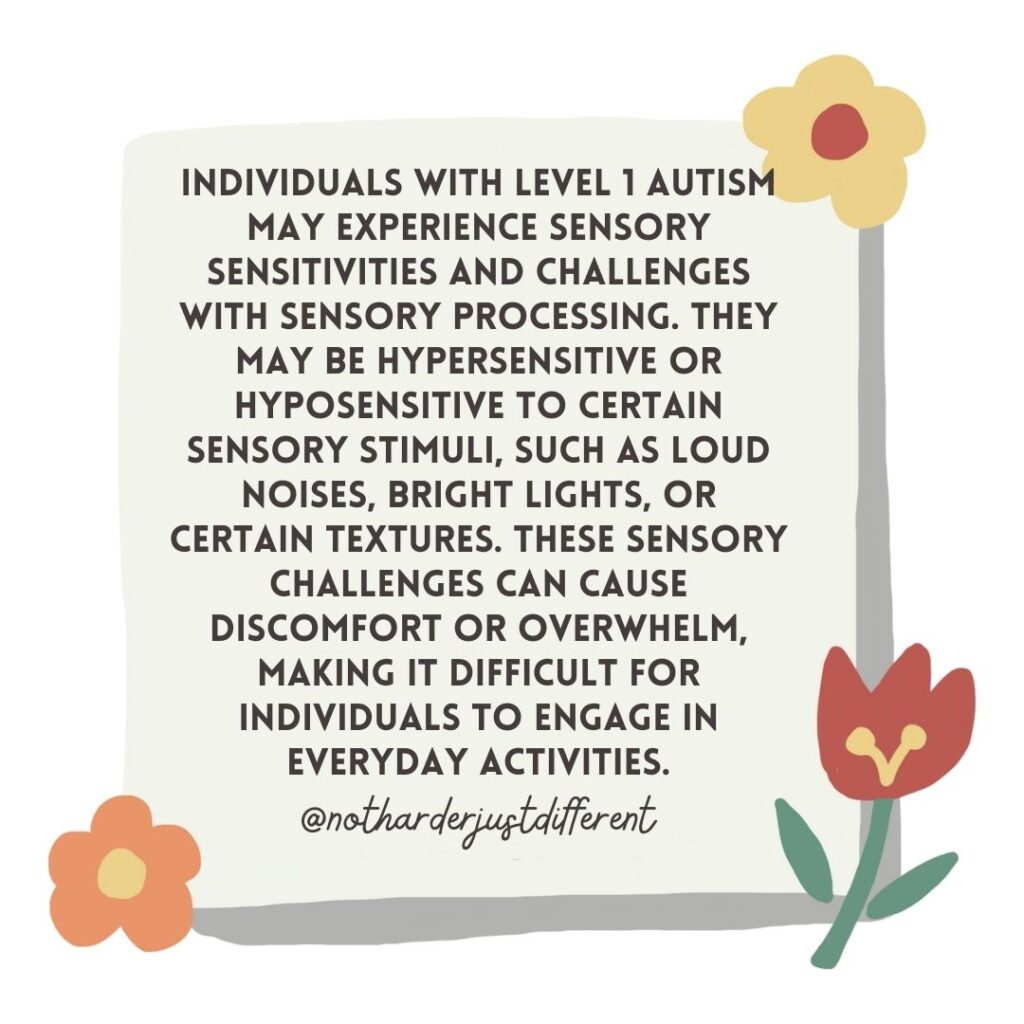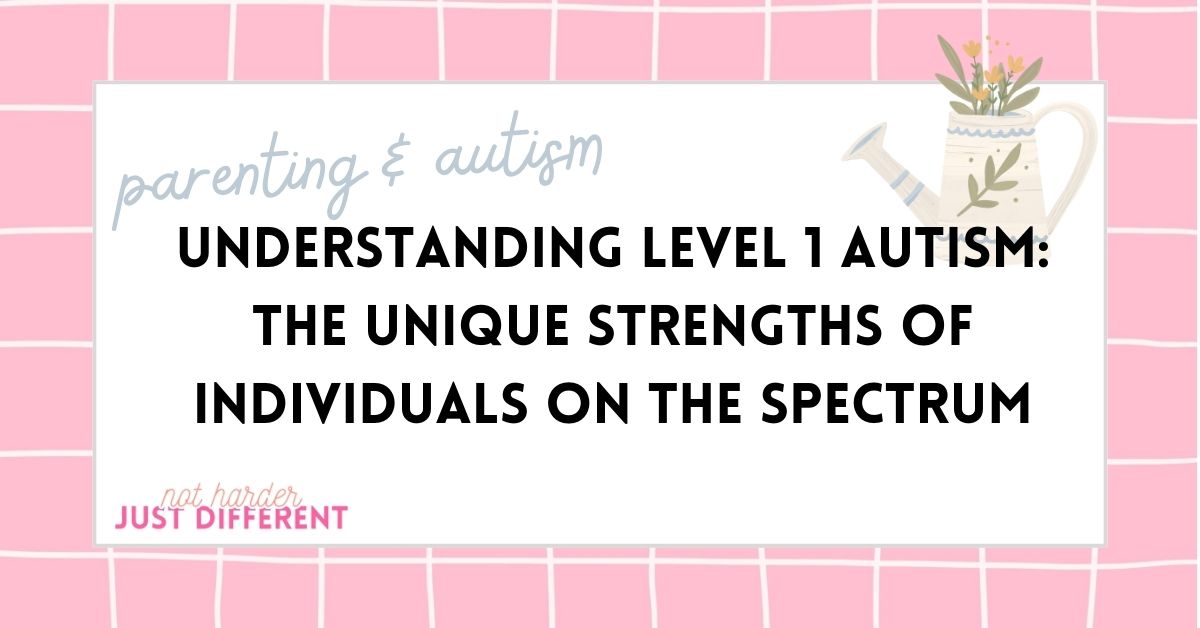Disclaimer: As a future Licensed Clinical Social Worker (LCSW) currently pursuing my master’s degree, I am passionate about sharing insights and information related to parenting, autism and homeschooling based on my personal experiences and research. However, the content shared on this blog is not intended to substitute professional advice, diagnosis, or treatment. Parenting is a deeply personal journey, and while I strive to provide valuable insights, every family and situation is unique. Readers are encouraged to consult with qualified professionals for personalized guidance tailored to their specific needs and circumstances.
First things first, let’s talk about what Level 1 autism actually means. Basically, it’s a way of describing individuals who have autism, but they may not need as much support as those with more severe forms of the condition. It’s kind of like saying they’re on the “milder” end of the spectrum, but trust me, that doesn’t mean their strengths are any less awesome! In fact, individuals with Level 1 autism often have unique abilities and talents that make them truly remarkable.
Table of Contents
Now, let’s shift our focus to the strengths-based approach we’re taking here. Instead of just focusing on the challenges that individuals with Level 1 autism may face, we’re all about highlighting their incredible strengths and talents. Because let’s be real, everyone has strengths, right? And individuals with Level 1 autism are no exception! So, get ready to be inspired as we explore some of the amazing strengths and abilities that make individuals with Level 1 autism truly shine.

Understanding Level 1 Autism
Level 1 autism, also known as “mild” or “high-functioning” autism, is a term used to describe individuals who have autism spectrum disorder (ASD) and require some support in their daily lives, but less support compared to those with more severe forms of autism. It’s important to understand that autism is a spectrum disorder, meaning that it encompasses a wide range of abilities, challenges, and characteristics.
Individuals with Level 1 autism may exhibit some of the core symptoms of autism, such as difficulties with social communication, repetitive behaviors, and sensory sensitivities. However, they often have fewer challenges in these areas compared to individuals with more severe forms of autism. For example, while they may struggle with social interactions and communication skills, they may still be able to engage in conversation and form relationships with others.
Common Strengths of Individuals with Level 1 Autism
Individuals with Level 1 autism possess a wide range of strengths and talents that contribute to their unique abilities and perspectives. While each individual is unique, there are several common strengths often seen in individuals with Level 1 autism:
- Attention to Detail: Many individuals with Level 1 autism have a remarkable ability to focus on details and notice patterns that others may overlook. This attention to detail can be advantageous in various settings, such as problem-solving, analytical tasks, and creative endeavors.
- Creativity: Individuals with Level 1 autism often exhibit a strong sense of creativity and imagination. They may have unique ways of thinking and expressing themselves, which can lead to innovative ideas, artistic pursuits, and imaginative play.
- Specialized Knowledge and Expertise: Individuals with Level 1 autism frequently develop intense interests and passions in specific topics or subjects. They may dedicate countless hours to learning about their areas of interest, becoming experts in their chosen fields and contributing valuable insights to discussions and projects.
- Logical Thinking and Problem-Solving Skills: Many individuals with Level 1 autism possess excellent logical thinking and problem-solving skills. They may approach tasks and challenges methodically, breaking them down into manageable steps and finding creative solutions to complex problems.
- Strong Memory: Individuals with Level 1 autism often have impressive memory skills, particularly when it comes to remembering facts, details, and information related to their areas of interest. This strong memory can be an asset in academic settings, work environments, and everyday life.
- Dedication and Perseverance: Individuals with Level 1 autism are often characterized by their dedication and perseverance in pursuing their goals and interests. They may demonstrate a strong work ethic, a commitment to excellence, and a willingness to overcome obstacles in pursuit of their passions.
Overall, the strengths of individuals with Level 1 autism are diverse and valuable, enriching our communities and contributing to the world in meaningful ways. By recognizing and nurturing these strengths, we can create environments that support the growth, development, and success of individuals on the autism spectrum.

Challenges and Support
While individuals with Level 1 autism possess many strengths and talents, they may also encounter challenges in certain areas of their lives. Understanding these challenges and providing appropriate support and interventions is essential for helping individuals with Level 1 autism thrive.
One common challenge for individuals with Level 1 autism is navigating social interactions and communication. They may struggle with understanding social cues, maintaining conversations, and forming friendships. As a result, they may feel isolated or misunderstood in social situations. Providing social skills training, peer support groups, and opportunities for socialization can help individuals with Level 1 autism develop their social skills and build meaningful relationships.
Individuals with Level 1 autism may experience sensory sensitivities and challenges with sensory processing. They may be hypersensitive or hyposensitive to certain sensory stimuli, such as loud noises, bright lights, or certain textures. These sensory challenges can cause discomfort or overwhelm, making it difficult for individuals to engage in everyday activities. Occupational therapy and sensory integration techniques can help individuals with Level 1 autism manage sensory sensitivities and improve their overall sensory processing skills.
Individuals with Level 1 autism may also face challenges in academic and occupational settings. They may struggle with organization, time management, and task completion, leading to difficulties in school or employment. Providing accommodations and supports, such as visual schedules, organizational tools, and task breakdowns, can help individuals with Level 1 autism succeed in academic and occupational settings.
Resources and Support
Access to resources, organizations, and support networks is crucial for individuals with Level 1 autism and their families to navigate challenges and access the support they need. Fortunately, there are numerous resources available that offer a wide range of support and services tailored to the needs of individuals with Level 1 autism.
- Advocacy Groups: There are many advocacy groups and organizations dedicated to supporting individuals with autism and their families. These groups provide resources, information, and advocacy support to help individuals with Level 1 autism navigate various systems, access services, and advocate for their rights. Examples include the Autism Society, and the Autistic Self Advocacy Network (ASAN).
- Therapy Options: There are several therapy options available to support individuals with Level 1 autism in developing social, communication, and sensory skills. Applied Behavior Analysis (ABA) therapy, speech therapy, occupational therapy, and social skills training are commonly utilized therapies that can help individuals with Level 1 autism thrive.
- Educational Programs: Many educational programs and schools offer specialized support and accommodations for students with autism, including those with Level 1 autism. These programs may include inclusive classrooms, individualized education plans (IEPs), and specialized interventions to address specific needs. Additionally, there are online resources and educational platforms that provide support and resources for homeschooling or distance learning for individuals with Level 1 autism.
- Support Networks: Support networks and peer groups can provide valuable emotional support, information, and resources for individuals with Level 1 autism and their families. These networks may include support groups, online forums, and social events where individuals can connect with others who share similar experiences and challenges.
- Community Resources: Local community resources, such as community centers, recreational programs, and disability services organizations, may offer additional support and resources for individuals with Level 1 autism and their families. These resources may include recreational activities, respite care services, and vocational training programs aimed at promoting independence and inclusion.
By tapping into these resources and support networks, individuals with Level 1 autism and their families can access the support and services they need to thrive. Whether it’s advocacy support, therapy options, educational programs, or community resources, there are many avenues available to help individuals with Level 1 autism lead fulfilling and meaningful lives.
Celebrating Neurodiversity
Neurodiversity is a term that celebrates the wide range of neurological differences found among individuals, including those with Level 1 autism. Emphasizing the importance of celebrating neurodiversity is essential for fostering acceptance, understanding, and inclusion in our communities and society as a whole.
Individuals with Level 1 autism often possess exceptional abilities and talents that can enrich our communities in profound ways. Their attention to detail, creativity, and intense focus on areas of interest can lead to innovations, breakthroughs, and new perspectives in various fields, including science, technology, art, and beyond.
Ultimately, celebrating neurodiversity is about recognizing the inherent value and dignity of every individual, regardless of their neurological differences. By embracing neurodiversity and celebrating the unique strengths and talents of individuals with Level 1 autism, we can create a more compassionate, inclusive, and equitable world for all.

